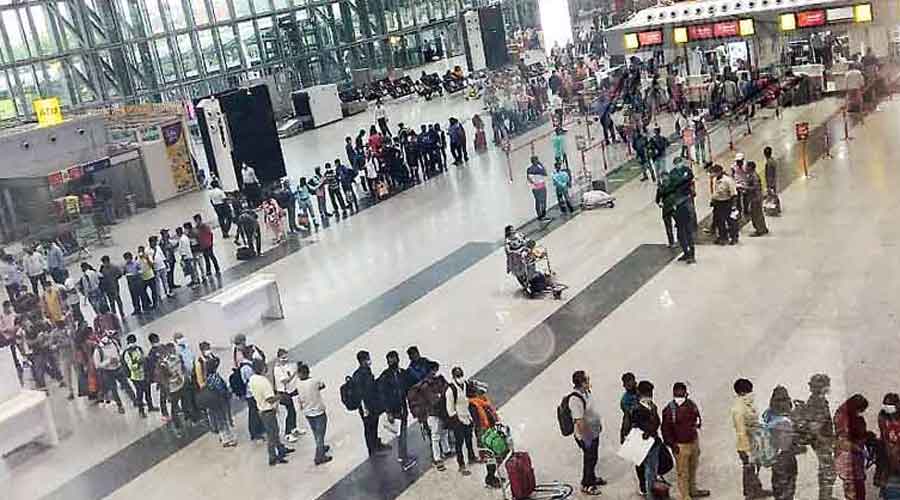Fully vaccinated travellers arriving in India will no longer need to furnish pre-travel Covid-19 test results, the Union health ministry said on Thursday, announcing updated travel guidelines that also dispense with mandatory seven-day quarantine.
Under the guidelines to apply from February 14, travellers may upload either a negative RT-PCR test report taken 72 hours prior to the journey or a full primary Covid-19 vaccination schedule completion certificate from countries that also offer quarantine-free entry to fully vaccinated Indians.
The health ministry has listed 82 countries or regions from where travellers may upload vaccination completion certificates instead of RT-PCR reports. The list includes Australia, Bangladesh, Cambodia, Canada, Hong Kong, Iran, Israel, the Maldives, Singapore, Thailand, the UK and the US, among others.
India has also removed the demarcation of “at-risk” countries and “other countries”. Until now, all travellers from “at-risk” countries had to submit nose-throat secretion samples at airports and wait until the result emerged before being allowed to leave.
The updated guidelines have also eliminated the mandatory seven-day home quarantine requirement but urge all incoming travellers to self-monitor their health for 14 days and report to health authorities if they develop Covid-19 symptoms.
“We’re seeing a decrease in cases across the world and simultaneously omicron has already spread worldwide — hence we’ve removed the demarcation of at-risk countries and other countries,” said Lav Agarwal, a joint secretary in the health ministry.
Incoming travellers need not take an RT-PCR test on day 8 after arrival to upload it on a government portal.
Agarwal said 2 per cent of travellers from all countries would continue to be tested through random sampling on arrival in an effort to keep track of global infection trends. Health authorities plan to send positive samples detected for genome sequencing to monitor variants.
Sections of public health experts had in December described India’s guidelines for international travellers as calibrated and measured in response to the fast-spreading omicron variant.
India’s own counts of daily new infections have declined in a near-steady fall since the current third wave peaked at 347,254 new cases on January 20. Health authorities on Thursday recorded 67,084 new cases over the previous 24 hours.
“We see a decline in cases and test positivity rates across all states,” Agarwal said. The number of districts where test positivity rates are greater than 10 per cent — a signal of large epidemics — decreased from 297 on February 2 to 141 on February 9.
Health officials, however, cautioned that the large epidemics in these districts and the continued circulation of the virus across India remain sources of concern and demand continued adoption of Covid-19-appropriate precautions and public health measures.
“This is no time to be lax, we need to maintain Covid-19-appropriate behaviour, including physical distancing, masks, hygiene and ventilation,” said Vinod Paul, member (health) in the Niti Aayog, the Centre’s apex think tank.











